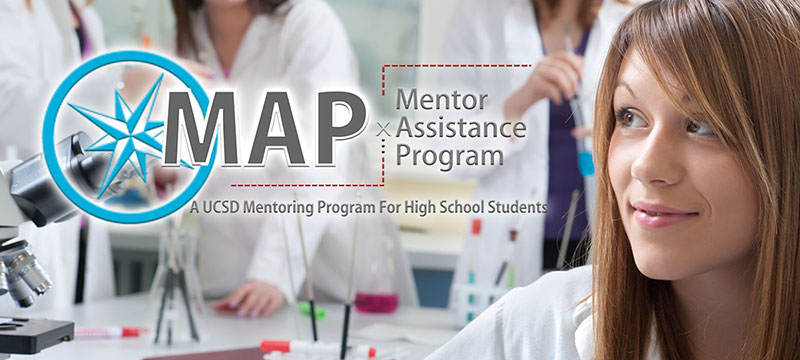

 Skip to navigation
Skip to navigation
Site Primary Navigation:
- About SDSC
- Services
- Support
- Research & Development
- Education & Training
- News & Events
Search The Site:

Published April 18, 2017

San Diego-area high school students interested in pursuing a career in scientifically-based research are invited to apply to UC San Diego’s Mentor Assistance Program (MAP), a campus-wide initiative designed to engage students in a mentoring relationship with an expert from a vast array of disciplines.
Launched almost two years ago by the university’s San Diego Supercomputer Center (SDSC) and UC San Diego School of Medicine, MAP’s mission is to provide a pathway for student researchers to gain access to UC San Diego faculty, post-doctoral fellows, Ph.D. candidates, and staff to mentor them in their own field of interest.
Mentors are being recruited from across campus from fields that include athletics, biology, chemistry, aerospace engineering, network architectures, pharmaceutical sciences, physics, social studies, and more. View a full list on the MAP website.
“MAP is an opportunity for students to take the first step into a potential career path, while simultaneously building an early foundation for success in their academic career.” said SDSC Education Manager and MAP Co-founder Ange Mason. “These mentoring relationships are intended to support collegiality, effective communication, self-evaluation, and cultural competence, all of which enhance a stimulating and supportive university environment.”
Students will volunteer two to four hours a week during the school year to become familiar with a particular lab or workplace on campus. Students may also choose to communicate with a mentor via email or may indicate their interest to visit the mentor’s lab or work environment.
The MAP student application process will open May 1 and will remain open through June 4, 2017. An application link will be provided on May 1. Application reviews and student selections will take place from June 1 to June 30. The mentoring period will run from September 2017 through May 2018.
Visit the website for more details about MAP.
About SDSC
As an Organized Research Unit of UC San Diego, SDSC is considered a leader in data-intensive computing and cyberinfrastructure, providing resources, services, and expertise to the national research community, including industry and academia. Cyberinfrastructure refers to an accessible, integrated network of computer-based resources and expertise, focused on accelerating scientific inquiry and discovery. SDSC supports hundreds of multidisciplinary programs spanning a wide variety of domains, from earth sciences and biology to astrophysics, bioinformatics, and health IT. SDSC’s petascale Comet supercomputer continues to be a key resource within the National Science Foundation’s XSEDE (Extreme Science and Engineering Discovery Environment) program.
Share